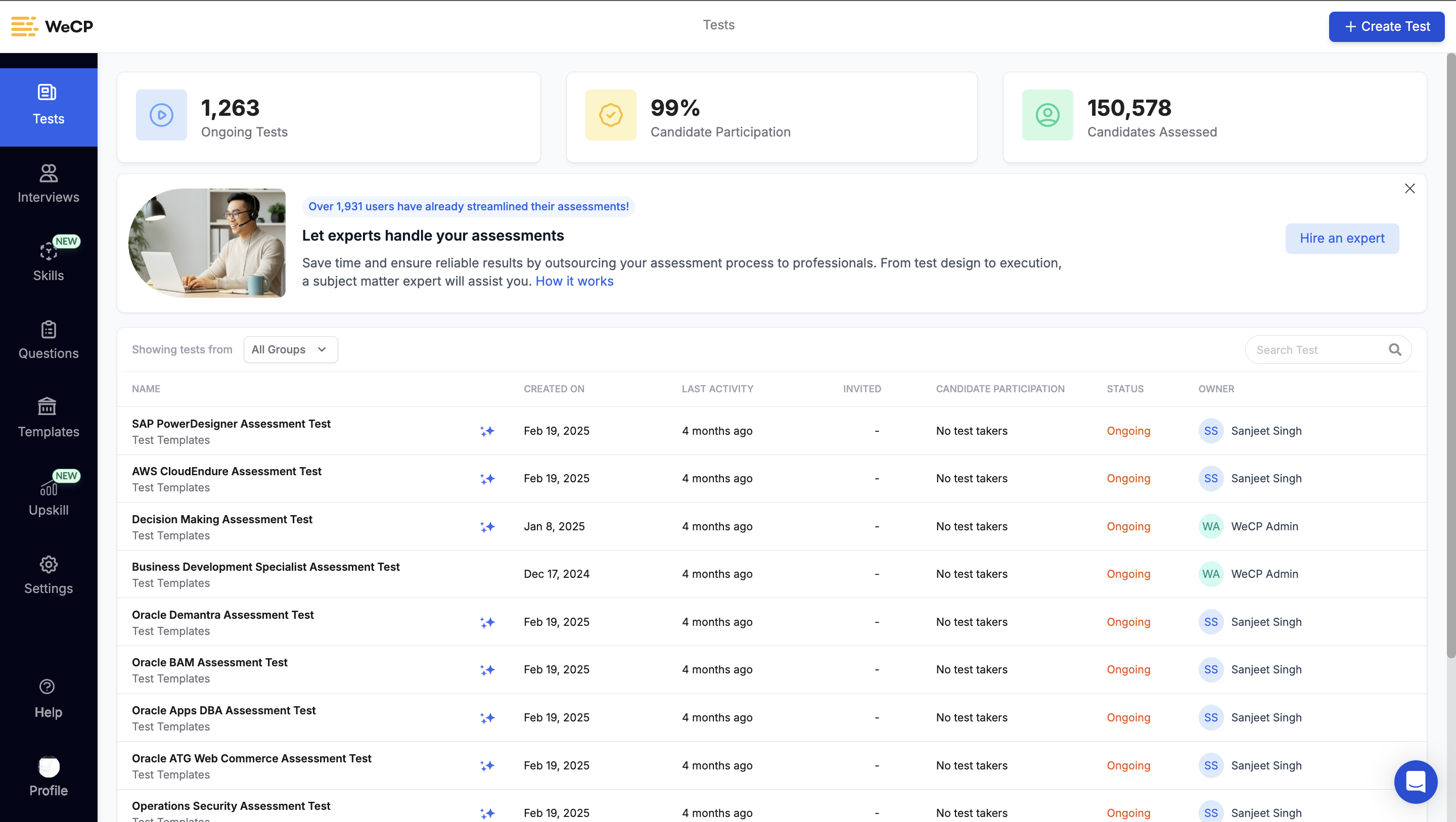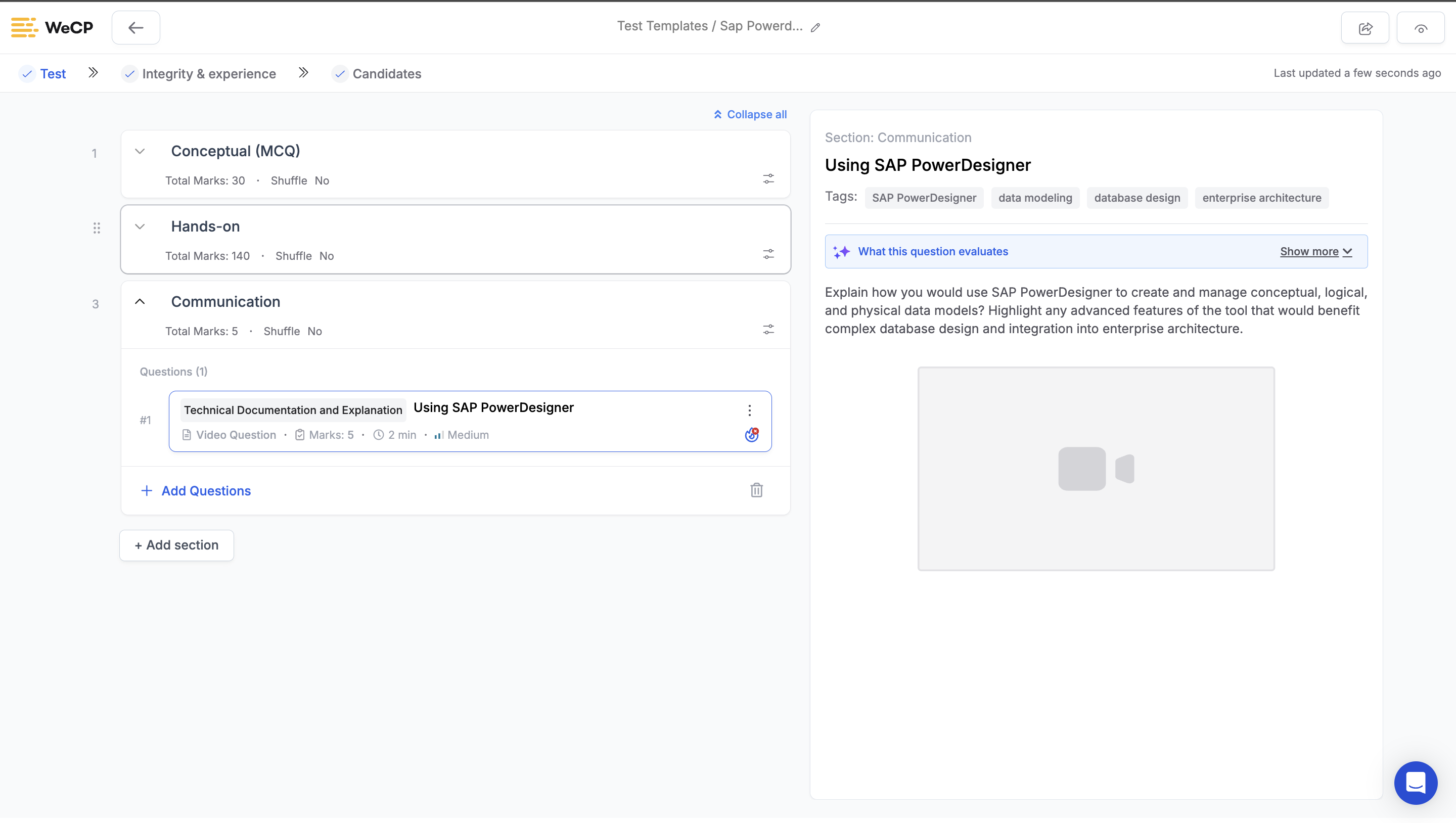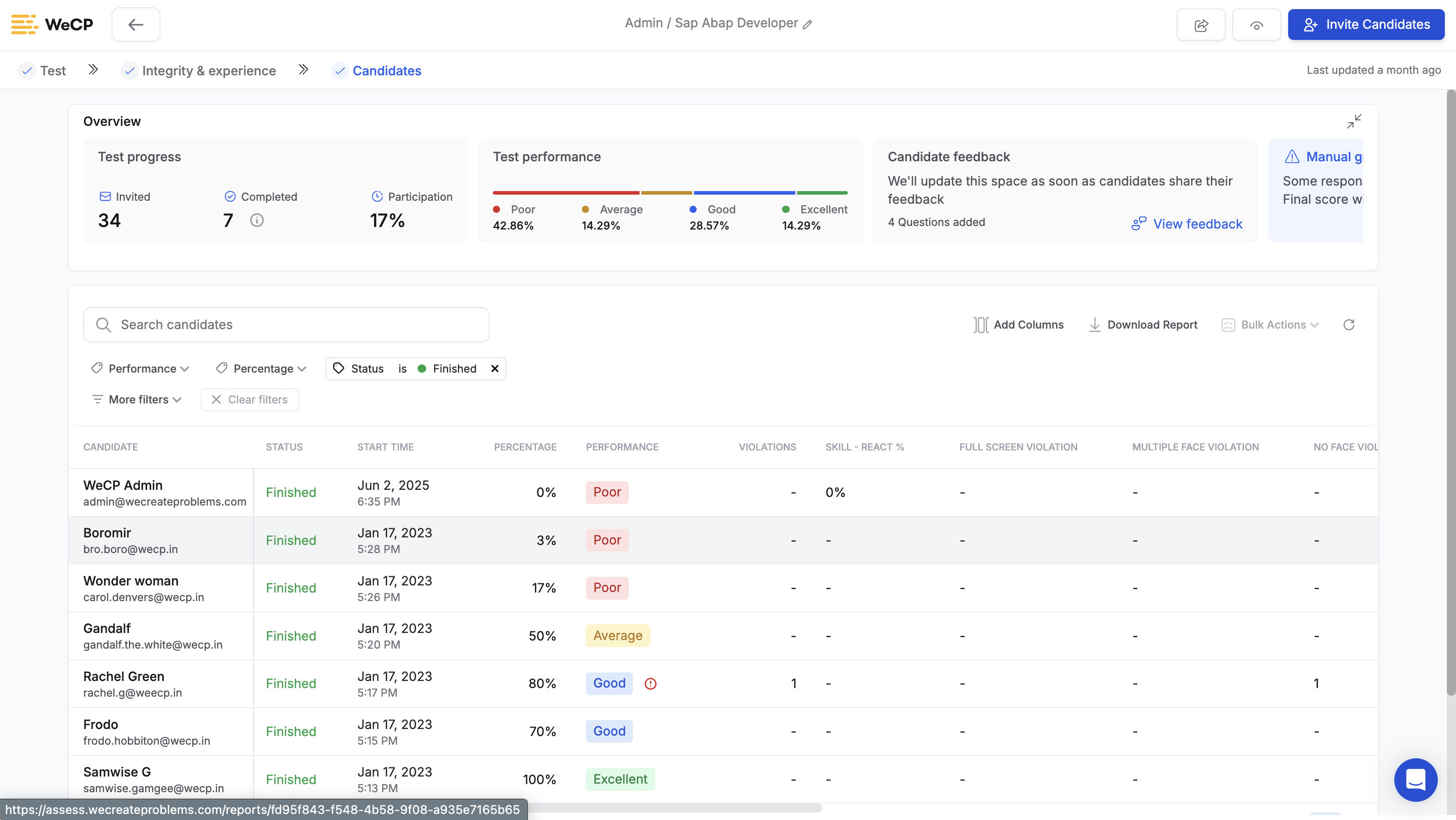
Overview
When you use WeCP (We Create Problems), you get an AI-powered platform designed to make technical hiring faster, smarter, and more reliable. Instead of spending hours building assessments from scratch, you can instantly generate job-specific tests, draw from a deep library of pre-built questions, or customize challenges to your exact role requirements. With built-in proctoring and cheat-detection, you don’t have to worry about test integrity — every assessment is secure and fair.
Beyond testing, you can run live technical interviews, track candidate progress, and receive detailed reports that highlight skills, strengths, and areas for improvement. This means you’re not just screening résumés. you’re evaluating real ability. Whether you’re hiring for software engineers, sales rep, or niche technical roles, WeCP helps you streamline your workflow, cut down hiring time, and confidently select the right talent.
Integration details
Just create your account here -> https://www.wecreateproblems.com/
Media
Features
AI-Powered Test Creation
Instantly generate job-specific coding and technical assessments tailored to your role.
Cheat-Proof Assessments
Advanced proctoring and Sherlock AI monitoring to ensure fair results.
Seamless ATS Integration
Send, track, and review assessments directly from SmartRecruiters.
Actionable Reports
Get detailed skill insights and candidate performance breakdowns in real time.
Resources
FAQ
WeCP leverages advanced artificial intelligence (AI) technologies to enhance the assessment and interviewing process.
1. Sherlock - AI Agent for Assessment Proctoring
Traditional proctoring is a case-by-case precautionary solution. Sherlock beats all the traditional way of combating cheating in online tests as a generalised AI Agent for proctoring.
2. You can generate complete tests using AI
2. You can generate complete tests using AI
Our AI algorithms can automatically generate comprehensive tests tailored to specific job roles and skills required. This feature ensures a thorough evaluation of candidates’ abilities with minimal manual effort.
3. Generate Programming Questions Using AI
WeCP’s AI can produce programming questions that are both innovative and relevant to real-world scenarios. These questions are designed to challenge candidates and assess their problem-solving and coding skills effectively. Watch WeCP AI in action
4. Generate MCQ Questions Using AI
4. Generate MCQ Questions Using AI
The AI-driven system in WeCP can quickly generate multiple-choice questions (MCQs) that are crucial for assessing theoretical knowledge and understanding of specific technologies or frameworks.
5. LLM powered question search
5. LLM powered question search
Poor filtering options make it difficult to narrow down results to the most pertinent questions that a Hiring Manager needs. But WeCP got you an amazing LLM powered question search.
7. Evaluate Subjective Responses Using AI
Our AI systems are equipped to impartially evaluate subjective responses, assessing them for relevance, coherence, and depth relative to the question posed, ensuring a fair and accurate evaluation.
8. Evaluate Video Responses Using AI
Video responses are analyzed by AI for content clarity, communication effectiveness, and non-verbal cues, offering a holistic view of the candidate’s performance beyond just their technical abilities.
9. Detect Impersonation Using AI
9. Detect Impersonation Using AI
WeCP incorporates AI-driven security measures to detect impersonation during tests. This feature ensures the integrity of the hiring process by verifying candidate identities through various authentication mechanisms.
WeCP uses a multi-faceted approach to mitigate bias when leveraging AI to evaluate essay responses. Replacing human graders with AI introduces efficiency, but key constraints remain: maintaining fairness and accuracy, and avoiding the amplification of existing biases. The biases here aren't necessarily demographic, but rather evaluation biases. For example, an AI might unfairly prioritize elaborate language over insightful content, or favor certain writing styles prevalent in its training data. Our goal is to mitigate these potential evaluation asymmetries. We employ a strategy that focuses on evaluating the core competencies demonstrated in the essay, rather than superficial aspects.
We then focus on the "Substance Over Style" principle. This is critical. The AI's evaluation shouldn't be swayed by just eloquent phrasing or sophisticated vocabulary if the underlying argument or understanding is weak. The idea of training AI to focus on core competencies comes into play. You want to train a model to assess the essay based on criteria that are difficult to manipulate without genuine understanding, but independent of stylistic preferences. This ensures that the score reflects the actual grasp of the topic and the strength of the arguments presented, not just how well it's "dressed up." The "adversary" in this case could be seen as the inherent tendency of some AI models to latch onto easily quantifiable surface features.
The AI model analyzes essay responses by breaking them down into key components. It's not just looking at word choice; it's evaluating the logical flow of arguments, the evidence provided, the clarity of thought, and the overall coherence in addressing the prompt. A crucial element is ensuring the AI is trained on a diverse dataset of high-quality essays, representing various writing styles and perspectives, to prevent it from inadvertently favoring a narrow range of expression. Furthermore, WeCP might employ techniques like debiasing the training data to remove any existing biases present in the human-graded examples used to train the AI. This could involve techniques like re-weighting examples or using adversarial learning to make the AI less sensitive to potentially biased features in the training data. The aim is for the AI to identify and reward genuine understanding and critical thinking, regardless of the specific writing style employed. By focusing on the substance, WeCP strives to create a fairer and more accurate evaluation process for essay-type questions using AI.









